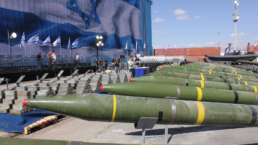At Israel’s first DefenseTech Summit, corporate leaders and army officials openly touted their partnership in AI-driven warfare and surveillance.
By Sophia Goodfriend, +972 Magazine
On Dec. 10, Israeli military officials, weapons manufacturers, and American venture capitalists gathered at Tel Aviv University for the first ever DefenseTech Summit. The two day affair featured panels on “The Future of Global Conflict,” “Challenges of Iron Swords” (the Israeli army’s name for the war in Gaza), and “Exploring Innovation in Drone Technology.” Representatives from Palantir, Sequoia Capital, and Elbit shared the stage with the director-general of Israel’s Defense Ministry and the head of “Lotem,” the army unit devoted to big data and AI.
I arrived early on Tuesday morning and stood in line to pick up my entry badge with representatives from Google Cloud and uniformed soldiers from “Mafat,” the Israeli army’s research and development wing. The event was packed full of tech workers, military representatives, and American investors eager to network.

Officially, the DefenseTech Summit was meant to showcase “Israel’s cutting edge technologies and strategies for addressing global security.” But the event felt more like a celebration of a new and unrestrained era of techno-militarization inaugurated by Donald Trump’s re-election.
Partnerships between Israel’s military and American venture capitalists and corporate heads are expected to ramp up under the Trump administration. Trump’s planned “government efficiency drive,” overseen by Elon Musk, champions joint projects between big defense contractors and smaller tech firms, especially in areas like AI and drone warfare. As Palantir’s Noam Perski put it in his speech on Tuesday morning, “All these people who used to be tech bros are now defense tech bros.”
Many American proponents of the overhaul are hardcore defenders of Israeli military strategy in Gaza over the last year. They cite Israel’s rapidly spinning door between the military and start-up sector as a model to be emulated — and a handful traveled to Ramat Aviv for the occasion.
Recent Posts
A War With Iran Would Not Be a One-Off Event But a Disastrous Ongoing Rupture
February 26, 2026
Take Action Now If Congress cedes its power to stop a war with Iran, it will fully erode any lingering promise of democratic restraint.By Hanieh…
New Addition to List of Nuclear Near Catastrophes
February 25, 2026
Take Action Now Debris flew for great distances — many times the distance of 270 meters to a nuclear reactor and nuclear storage facility.By David…
Gavin Newsom’s last budget belies his ‘California for All’ pledge
February 24, 2026
Take Action Now Yet, even as the state is poised to lose billions in federal funding, and millions of Californians are losing access to health care…
Israel and American Hawks are Pushing U.S. to Iran War With Catastrophic Consequences
February 23, 2026
Take Action Now At the World Health Assembly in May, member states may endorse an unprecedented strategy declaring that health is not a cost – but…




